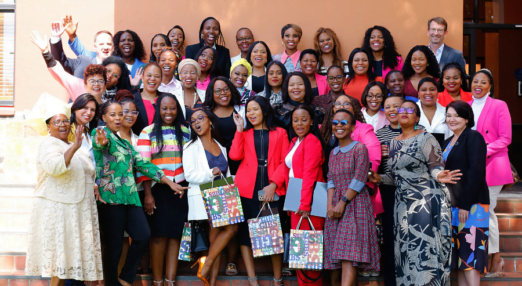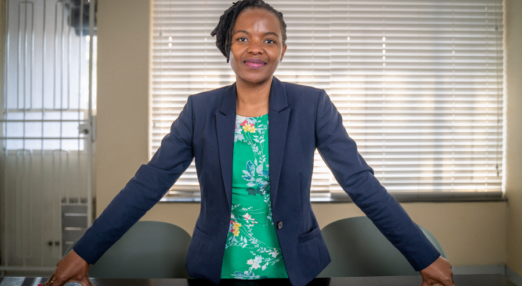Building confidence: A key to women’s business success
Confidence is crucial for women entrepreneurs' business journeys. Our Senior Manager - Evidence and Learning, Rachel Seftel, explains.

Our training and mentoring programmes are designed to achieve a specific set of outcomes, but all share one in common: to build women’s confidence, supporting them to start and grow thriving businesses. But why is confidence such a critical ingredient in a woman entrepreneur’s journey, and how exactly does it translate into success? Our Senior Manager – Evidence and Learning, Rachel Seftel, explains…
One of the most significant and meaningful outcomes we see, across all of the countries in which we work, is that women entrepreneurs report significant increases in their self-confidence after participating in our training and mentoring programmes. In fact, three quarters (74%) of the 20,665 women we supported in 2023 increased their business confidence.
This isn’t inadvertent: cultivating confidence is purpose-built into the design of our programmes as an explicit pathway to accelerating success for women-owned businesses. But why does confidence matter? If our mission is to empower women entrepreneurs to start, sustain and grow a business, why do we focus on attitudes and beliefs and not just the bottom line?

At the Cherie Blair Foundation for Women, one of our core principles is ‘Powered by Knowledge’, and we are committed to a continuous cycle of monitoring, evaluation and learning to assess how effectively we can support women entrepreneurs to thrive. For us, it is not enough to identify and articulate the impact of our programming with women entrepreneurs – we need to continuously learn and gather evidence about why our approach works and how we can build our existing successes. What are the mechanisms by which women are able to grow their businesses? What strategies are most effective, and what makes them effective?
It’s a challenge accessing finance and a lot of women don’t have the confidence to ask for money... I am now able to do my bookkeeping perfectly, and have a lot more confidence when it comes to financial matters.
This enquiry-based approach is challenging for organisations to maintain in the face of an ever-growing demand for project outcomes to be collected and aligned with donor reporting frameworks – frameworks that focus nearly exclusively on specific financial or economic indicators. A growing number of monitoring and evaluation practitioners are identifying this approach as anti-feminist, and at odds with an overall push within the third sector to decolonialise international development.

As an explicitly feminist organisation, we anchor our evaluation in understanding women’s lived experiences, and are lucky to have private and public sector partners who support this approach. Last year, we conducted major evaluations of our programming in four countries: Nigeria, South Africa, Kenya and Guyana. Our findings corroborated other evidence in the sector that low self-confidence is a major barrier to women’s economic empowerment. More importantly, though, they provided exciting new insights into the specific ways in which our programmes build women’s confidence, and how this increased confidence contributes to improvements in businesses’ profitability.
Self-confidence is central to an entrepreneur’s willingness and ability to take risks, make difficult decisions and advocate for their business interests. Yet for women, this capacity is mediated by a complex system of stereotypes, biases, cultural norms and social expectations that stymie their confidence. When we support women entrepreneurs, whether through our Mentoring Women in Business programme, our suite of ‘Road to’ business skills training programmes, or our award-winning business skills app, HerVenture, women are not asked to apply the knowledge and skills they learn in a vacuum, but within a specific community, culture and context. It is not enough to provide women with new knowledge and skills – they must be equipped with the belief that they can act on them.
Across multiple countries, women spoke eloquently about how our programming had helped change their self-perception. They described how they now see themselves as ‘businesswomen,’ when they had previously viewed their businesses as more of a hobby or a ‘side hustle’. Three key themes emerge as critical drivers of this transformation:
- Completion of a challenging training, providing women with an intrinsic sense of accomplishment, particularly among those with limited formal education and/or no prior opportunities to learn business skills.
- Explicit encouragement from trainers and a cohort of peers, scaffolding a shift in self-perception as women grew to recognise the traits that others see in them.
- Knowledge and skill acquisition, giving women self-assurance that they know what they are doing, and that their business decisions are rooted in best practices.

The most challenging bit about being a female entrepreneur is negotiating with buyers in a male-dominated industry. You have to stay strong and confident so that you are not taken advantage of. I learned to have the confidence to say no.
Improving women’s confidence is a laudable outcome in itself, especially in countries with high levels of gender inequality. However, our evaluations shed a new light on the ways in which improved self-confidence directly contributes to improved business growth and profitability:
- Price increases, leading to improved profitability. Women tend to value their time or effort far below what the market would bear due to self-doubt. As their confidence increases, they feel empowered to set prices that fairly account for their time and the value of their product or service.
- Increased assertiveness in critical business settings and improved negotiation skills that open new doors. Whether negotiating with suppliers over pricing or financial institutions on loan terms, women report direct improvements to their top and bottom lines when they can advocate for their interests.
- An increased willingness to be publicly visible grew sales and customer bases. Confidence is linked to an expanded openness among women to actively market products and services and to take opportunities they previously would have foregone, such as attending business expos or approaching new potential clients or distribution channels.

The Mentoring programme enabled me to grow my confidence and challenge my imposter syndrome. Now, if I’m offered an opportunity to do something, I dive into it without fear.
Breaking down barriers for women entrepreneurs demands investment in learning, not just reporting to funders. As we scale up our work to reach one million women entrepreneurs by 2030, we rely on the voices and experiences of the women we support to tell us what works and what does not. Hundreds of hours of interviews and focus groups in 2023 with women entrepreneurs illuminated the profound role that confidence plays in improving their business strategies, negotiation skills and market visibility.
As a vital component of success, confidence will continue to be an explicit aim of our programming, and a key outcome that we measure. By prioritising and cultivating self-confidence, we not only enable women to thrive as entrepreneurs but also challenge systemic barriers. This paves the way for more inclusive and sustainable economic development and gender justice.
I’ve gained a lot of confidence. Because of this I’ve certified myself as a business mentor, so I can extend my help and advice to others that need it.
Become a corporate partner
Learn how your company can work with us to bring our services to more women entrepreneurs in low and middle income countries.

Read more news...
-

We’re supporting 45,000 women across Sub-Saharan Africa with DHL Express
Through our renewed multi-year partnership with DHL Express, we'll expand our reach and deepen our impact.
Read more
-

Building confidence: A key to women’s business success
Confidence is crucial for women entrepreneurs' business journeys. Our Senior Manager - Evidence and Learning, Rachel Seftel, explains.
Read more
-

Announcing our new trustees
We are delighted to welcome Suzanne Ehlers, Francesca Nxedhlana and Winnie Wambugu to our Board of Trustees.
Read more
